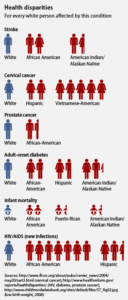
That’s because, according to these researchers, disparities in health aren’t connected to race or ancestry.
“What we found in the literature published from 2007 to 2013 was basically nothing,” Jay Kaufman, the lead author of the first study to examine available genetic data for evidence that explains racial-health disparities, told The Atlantic.
In other words, it seems that the idea of health disparities being caused solely by someone’s skin color or ancestry may not be as true as many have long believed.
Instead, a host of socially constructed disadvantages that plague communities of color and low-income neighborhoods could truly be the culprit behind disparities in health and persistent gaps in life expectancy.
“It is no secret that a longer life is a white privilege in the U.S.,” The Atlantic’s Jason Silverstein writes.
A 2011 report by the Centers for Disease Control and Prevention (CDC) revealed that white men lived more than four years longer than Black men while white women lived more than three years longer than Black women.
This type of trend has been plaguing the Black community for years, causing some researchers to focus on studies that they believed would prove that Black people were genetically inferior to their white counterparts.
“It is much easier to say it must be something [wrong] with those people than it is [to say something’s wrong] with the way we have arranged society,” Michael Montoya, the author of Making the Mexican Diabetic: Race, Science, and Inequality, told The Atlantic.
Of course, years of more recent research have revealed the many ways that people in poverty-stricken areas or those subjected to the stressful impacts of racism drastically have their life expectancy slashed when compared to their privileged counterparts.
Despite these findings, money is still being poured into research that assumes people of different races are genetically cursed to deal with certain health issues at a greater rate than others.
This is partly due to the misleading facts about how diseases spread in certain populations.
“Certain diseases cluster in populations, such as Tay-Sachs, which is most common in people with an Ashkenazi Jewish background,” The Atlantic explains. “In such cases, some researchers say we should turn our attention away from race and towards ancestry.”
Focusing on ancestry, however, is just as scientifically flawed as focusing on the color of one’s skin as the cause of their health issues.
“Even when researchers study ancestry, it is often just race in a phony mustache and glasses,” Silverstein adds.
That’s because looking at ancestry is still yet another way researchers overlook the depth of the true issues at hand.

For years, studies have revealed severe gaps in health care, access to pharmacies and clinics and the availability of healthy food options in predominantly Black and low-income neighborhoods.
These findings are much more closely related to the shorter life expectancies for Black people when compared to their white counterparts.
For this reason, Kaufman believes people need to realize that these health disparities are not just something people are born into. It’s the result of a society that refuses to correct its own racist institutions.
“If you show that this is a predisposition that is genetically determined—black people just have this gene, there’s nothing we can do about it, this is just nature—then society is completely absolved. We don’t have any responsibility to solve this problem,” Kaufman added. “If you show that it is because of racism and injustice and people’s living conditions, well, then, there is some responsibility and we have to do something about this.”
So instead of handing over billions to research that is supported by a scientifically flawed assumption about people of color, there is a greater need to invest in the type of infrastructure and equity that could rid Black communities of the medical disadvantages they are forced to face under America’s racist institutions.


